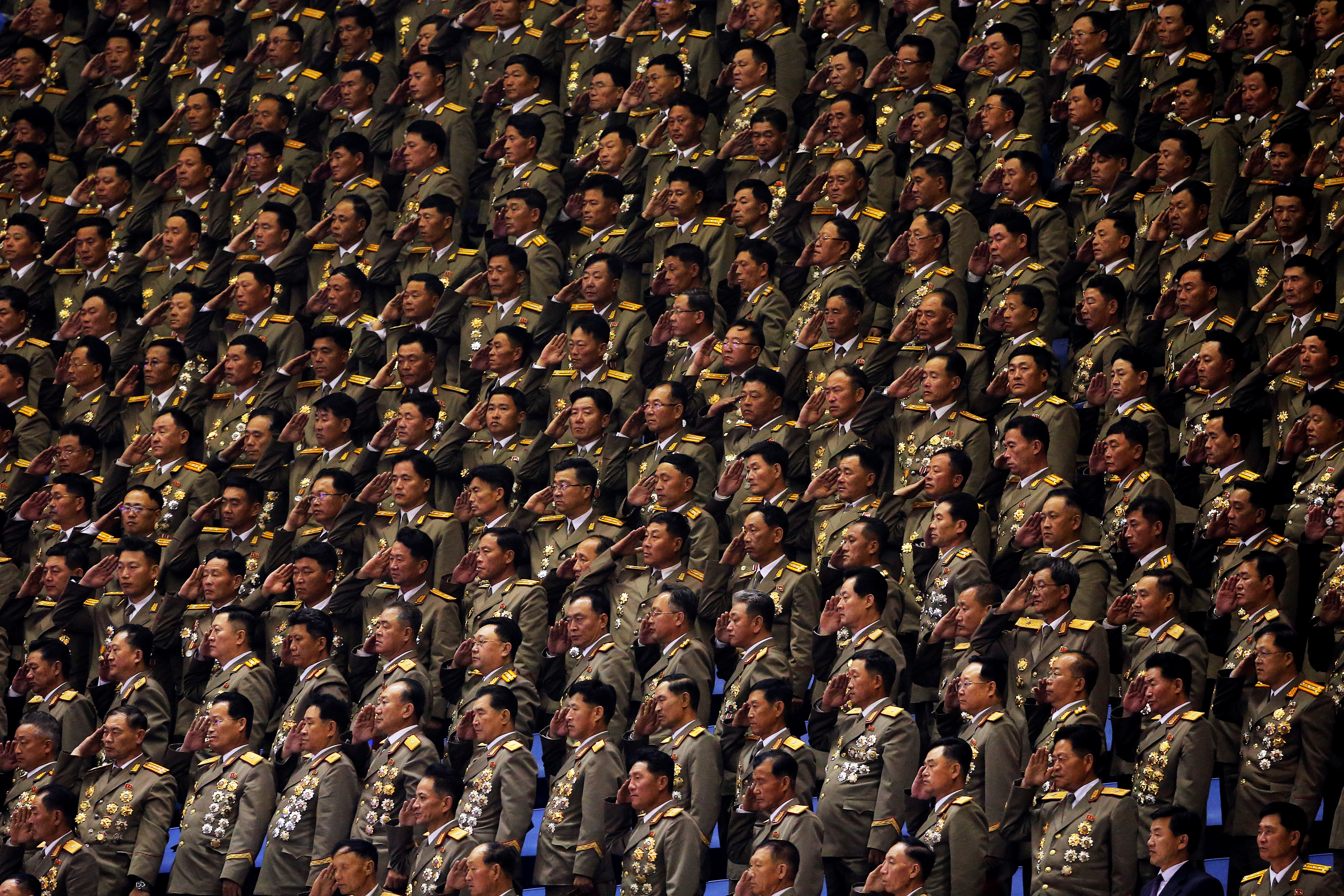There's only 1 way to solve the North Korea crisis
No, it doesn't involve missiles or ships or troops


A free daily email with the biggest news stories of the day – and the best features from TheWeek.com
You are now subscribed
Your newsletter sign-up was successful
North Korea has once again tested an intercontinental ballistic missile — and this time there is no doubt Pyongyang has a missile with the range to hit a large swath of the U.S. homeland.
This means it's time for some hard truths.
We all know how to solve the Rubik's Cube that is the Democratic People's Republic of Korea once and for all: No more North Korea. That means reunification with South Korea under the leadership of Seoul. But how, you ask?
The Week
Escape your echo chamber. Get the facts behind the news, plus analysis from multiple perspectives.

Sign up for The Week's Free Newsletters
From our morning news briefing to a weekly Good News Newsletter, get the best of The Week delivered directly to your inbox.
From our morning news briefing to a weekly Good News Newsletter, get the best of The Week delivered directly to your inbox.
Even if you decided that a military attack with the goal of regime change was somehow a good idea — which, by the way, is what North Korea fears most and is the reason it has been building nuclear weapons in the first place — amassing hundreds of thousands of troops, tanks, aircraft, and ships would be a clear sign to Kim Jong Un that he should pack his bags for a one-way trip to hell. I guarantee you, Kim doesn't want to end up like Saddam Hussein or Moammar Gadhafi.
The portly pariah of Pyongyang's response would be simple: fire every nuclear, chemical, and biological weapon he can at South Korea and Japan, killing millions of people in the process. He would unleash his 1.1 million men under arms, his 4,300 tanks would roll south, his 200,000 special forces would climb into prepared tunnels and lash out. And don't think for a second he wouldn't try to launch a nuclear-tipped missile at U.S. bases, Alaska, Hawaii, or the homeland if he could. Knowing his time on planet Earth was up, Kim would take as many poor souls to the grave as he could.
That's no solution — but we do have options.
We need to begin thinking of ways to take advantage of the day when North Korea does start to collapse. Because if history tells us anything, it's that authoritarian regimes like the DPRK all live on borrowed time. Whether through a looming drought, another mass starvation, or the outside world slowly creeping into the lives of ordinary North Koreans, the Kim family's days in power are numbered. We must not only prepare, but push that date as close to the present as possible.
A free daily email with the biggest news stories of the day – and the best features from TheWeek.com
Thankfully we have tools to make that happen. We can begin planting the seed in those around Kim Jung Un, specifically the hundreds of thousands of elite North Korean officials he relies upon to run the country day in and day out, that if unification were to come, that they would not feel the wrath of the U.S. or South Korea.
The research into this subject has already been done. Bruce Bennett, a colleague of mine from the RAND Corporation, recently released a study examining what North Korean elites would need in order to not fear reunification and potentially back it when the time is right.
Bennett, one of the world's most experienced North Korea watchers and an expert on Korean unification, defines five criteria that, in his words, "would likely help North Korean elites feel that unification could be good for them." They include: a guarantee that their safety and overall security never be threatened; that their positions would be maintained; that their families' safety and privileges be secure; and that they would have some sort of meaningful role in a new, united Korea.
Indeed, such guarantees are not without historical precedent. Bennett pointed out to me recently that his work is modeled on the reunification of Germany. East German elites did not fear being hauled off to jail or execution because they knew they had nothing to fear — they even knew what their retirement would look like under a reunited Germany. So when the state began to collapse, they did not put down challenges to their power.
But just like all things North Korea, the plan does come with some controversy. To ensure the North Korean state doesn't completely collapse in the years it would take to implement reunification, you would need to leave in place thousands of North Korea officials to run essential services — and grant those officials amnesty.
As Bennett himself points out, that would likely draw the ire of many South Koreans and others in the international community. Many would make the argument that pardoning anyone associated with such a regime is a terrible mistake. However, to find a couterpoint, you only have to look to the 2003 invasion of Iraq and the dismissal of Baathist and army officials, which drove a bloody insurgency. When you have no job, no hope, and no future, conflict is a real possibility. And since North Korean officials could have access to real weapons of mass destruction, the possibility of a nuclear North Korean civil war is as horrific as it sounds.
To alleviate this challenge, Bennett proposes amnesty to those who have committed offenses like bribery and financial crimes, but punishment for those who have committed human rights abuses. Simply put, if you ran a North Korean gulag, you aren't getting a gold-plated retirement package. Sorry.
There are also some other obvious challenges to the plan: How would you even explain the plan to North Korean elites? How would Kim Jong Un react? And how can you accurately predict when the state would collapse? If elites, egged on by U.S. or South Korean promises, rebelled against the state only to be killed by Kim, reunification could be setback for decades.
Those are all fair criticisms. However, we must begin preparing for the day when North Korea beings its final descent into the ash heap of history. And North Korean elites who aren't Kim Jong Un must know we won't throw them in the heap too. That might just help bring about real freedom to the 25 million souls behind one of the world's last iron curtains.
Harry J. Kazianis is director of defense studies at the Center for the National Interest, founded by former U.S. President Richard M. Nixon.
-
 The ‘ravenous’ demand for Cornish minerals
The ‘ravenous’ demand for Cornish mineralsUnder the Radar Growing need for critical minerals to power tech has intensified ‘appetite’ for lithium, which could be a ‘huge boon’ for local economy
-
 Why are election experts taking Trump’s midterm threats seriously?
Why are election experts taking Trump’s midterm threats seriously?IN THE SPOTLIGHT As the president muses about polling place deployments and a centralized electoral system aimed at one-party control, lawmakers are taking this administration at its word
-
 ‘Restaurateurs have become millionaires’
‘Restaurateurs have become millionaires’Instant Opinion Opinion, comment and editorials of the day
-
 Epstein files topple law CEO, roil UK government
Epstein files topple law CEO, roil UK governmentSpeed Read Peter Mandelson, Britain’s former ambassador to the US, is caught up in the scandal
-
 Iran and US prepare to meet after skirmishes
Iran and US prepare to meet after skirmishesSpeed Read The incident comes amid heightened tensions in the Middle East
-
 Israel retrieves final hostage’s body from Gaza
Israel retrieves final hostage’s body from GazaSpeed Read The 24-year-old police officer was killed during the initial Hamas attack
-
 China’s Xi targets top general in growing purge
China’s Xi targets top general in growing purgeSpeed Read Zhang Youxia is being investigated over ‘grave violations’ of the law
-
 Panama and Canada are negotiating over a crucial copper mine
Panama and Canada are negotiating over a crucial copper mineIn the Spotlight Panama is set to make a final decision on the mine this summer
-
 Why Greenland’s natural resources are nearly impossible to mine
Why Greenland’s natural resources are nearly impossible to mineThe Explainer The country’s natural landscape makes the task extremely difficult
-
 Iran cuts internet as protests escalate
Iran cuts internet as protests escalateSpeed Reada Government buildings across the country have been set on fire
-
 US nabs ‘shadow’ tanker claimed by Russia
US nabs ‘shadow’ tanker claimed by RussiaSpeed Read The ship was one of two vessels seized by the US military
